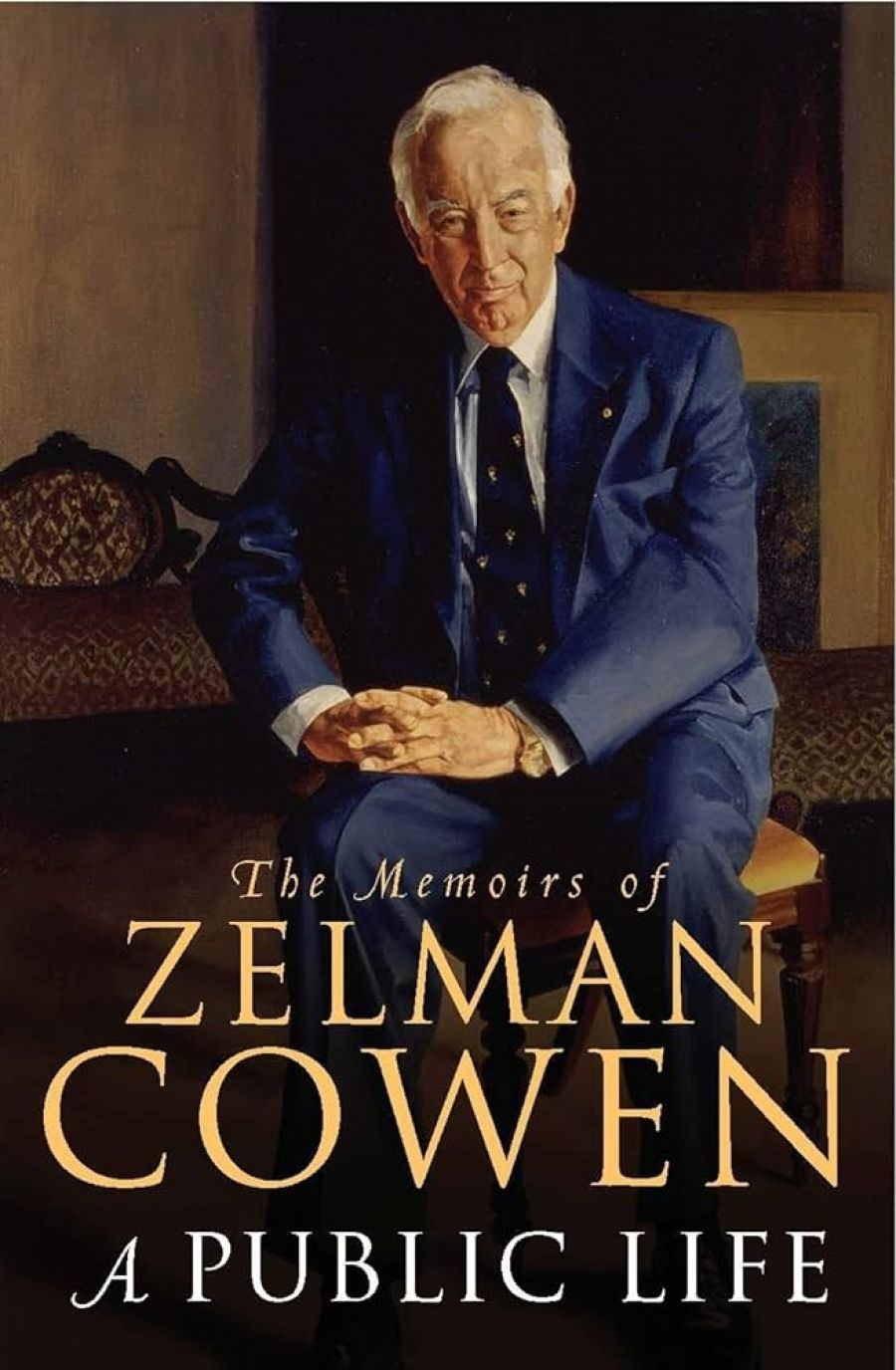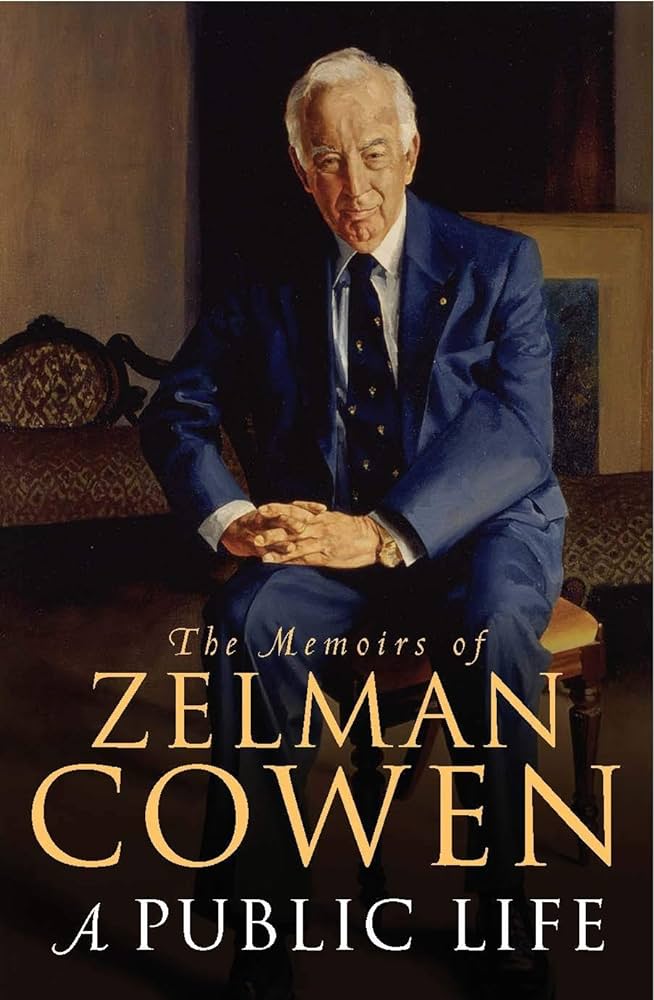
- Free Article: No
- Contents Category: Memoir
- Review Article: Yes
- Article Title: Eminent Victorian
- Online Only: No
- Custom Highlight Text:
Justice Michael Kirby’s launching of Sir Zelman Cowen’s memoirs at the Melbourne University’s Woodward Centre in early June was a great Melbourne occasion. Two of Cowen’s successors as governor-general, Sir Ninian Stephen and Archbishop Peter Hollingworth, attended as part of a galaxy of judges, barristers, academics and a scattering of ex-politicians. The occasion was a festival of oratory, with five substantial speeches, possibly an Australian record for a book launch.
- Book 1 Title: The Memoirs of Zelman Cowen
- Book 1 Subtitle: A public life
- Book 1 Biblio: Miegunyah, $59.95 hb, 416 pp
- Book 1 Cover Small (400 x 600):

- Book 1 Cover (800 x 1200):

Michael Kirby referred to Sir Zelman’s battle with Parkinson’s disease, remarking: ‘He is our Australian Muhammad Ali. I suspect that he has some more gentle mental punches still to deliver.’ Publicity about A Public Life has concentrated on the author’s revival, almost exhumation, of the republican issue, when he wrote: ‘I now… think that an Australian head of state is so desirable that, if popular election is the only way of achieving this outcome, I would reluctantly support it. Australia’s sense of national identity has evolved to the point where the position of the British monarch as Queen of Australia is incompatible with our independent status.’
As the title suggests, this memoir concentrates on a public life, and the structure of the book ensures that Cowen’s private life, other than his gratitude for an outstandingly happy marriage and family life, remains largely veiled. Thus chapters on war service, Oxford, the Melbourne Law Faculty, the University of New England, the University of Queensland, being governor-general and the return to Oxford have the effect of crowding out material about the inner life. His views on politics and religion remain enigmatic, in sharp contrast to Sir Edward Woodward’s One Brief Interval (2005). I would have welcomed more on Cowen’s role as a public intellectual, where he took every opportunity to explain complex issues on radio and, after 1956, television, and where the media classified him as AA (‘always available’). Of course, his role was not as a partisan. His commitment to adult education was outstanding and should have been expanded in his book.
Material on his family, childhood and education is the liveliest part of the memoir. He was born in St Kilda on 7 October 1919. Both parents, Bernard Cohen (the spelling was changed to Cowen in 1922) and Sara Granat, had migrated from tsarist Russia with their families, in 1903 and 1891 respectively. Sir Zelman, always keen on historical continuities, points out that he was born on the day that Alfred Deakin died and the Dutch airline KLM was founded.
His description of growing up in St Kilda, when the Victory and Palais cinemas were glamorous and exciting, is vivid and engaging. I grew up in the next suburb and, despite a now modest age gap between us, can empathise with his experiences. He began at Brighton Road State School in 1925 (when Sidney Nolan was also a pupil), then transferred to St Kilda Park Central School in 1927. He learned piano, without success, from Henri Penn, who conducted the orchestra at the Palais cinema in the last years of the ‘silent’ era, and who later became my musical mentor. Sir Zelman retains a great passion for music, especially Mozart.
Influenced by reading The Magnet, the English boy’s paper about Greyfriars School and Billy Bunter, Zelman aspired to attend Geelong Grammar, succeeded in an entrance exam in 1931 (year nine), but was faced with a challenge, even under the liberal régime of J.R. Darling, the headmaster: attendance at chapel was compulsory. So he opted for Scotch College, where John Monash had been a student.
Sir Isaac Isaacs, Australia’s first native-born governor-general from 1931 to 1936, was an obvious role model, even more than Monash, and it strongly influenced Zelman Cowen’s career path. Isaacs was an integrationist Jew who drew attention to the rising persecution of Jews in Europe but later opposed the creation of Israel as a ‘Jewish state’. Cowen’s adolescence was shaped by the upsurge of European anti-Semitism; even before leaving school, he wrote a short story called ‘Pogrom’, anticipating elements of the Holocaust.
The young Zelman secured outstanding Matriculation results, entering Melbourne University as a law student in March 1936, where he was exposed to impressive teachers, including Ernest Scott, Max Crawford, Macmahon Ball and Kathleen Fitzpatrick, becoming actively involved in the arts and adult education programs. He won the Supreme Court Prize and the Rhodes Scholarship in 1941, but was only able to enter Oxford after service in naval intelligence, having declined an offer to work for the master tactician Alf Conlon.
Then came marriage to Anne Wittner in 1945, five intense years of research and teaching at Oxford, and in 1950, aged barely thirty, he was appointed Professor of Public Law at Melbourne University and, soon after, Dean of the Law Faculty as well. I should declare an interest, as a law student under Professor Cowen, although not one of his better ones. But he was undoubtedly charismatic, and I admired his courage in speaking against Robert Menzies’ attempt to ban the Communist Party and the rising tide of McCarthyism which made him, briefly, a person of interest to ASIO. For some years we were team members in the radio quiz show Information, Please. Later, he served with me on the Anti-Hanging Committee (Victoria) during the controversy over Sir Henry Bolte’s determination to hang Robert Peter Tait. He shares my view that it was Bolte’s defeat on Tait that guaranteed that Ronald Ryan was executed in 1967.
Leaving Melbourne in 1966 to become vice-chancellor of the University of New England looked like a strange career move. But he was invited to apply and did so. As he writes, he ‘knew little’ about UNE, and it was remote and small, with only 1,300 full-time students and fewer than 3,000 external students. He admits that by his ‘third year at New England, I had begun to feel unhappy’, due to his realisation that UNE would never become a national institution. In 1969 he was offered the vice-chancellorship at the University of Queensland, a far bigger institution, accepted and took up appointment in March 1970. It was the first time that an Australian vice-chancellor had transferred from one university to another, and he was to set a fashion.
The most powerfully written part of A Public Life turns out to be his years at the University of Queensland (1970–77), a period when politics still mattered. The campus was wracked by violent demonstrations against the Vietnam War (1970) and the tour by the South African rugby team, the Springboks (1971), and by the student occupation of buildings. Queensland’s Premier, Joh Bjelke-Petersen, authoritarian in temperament and deeply anti-intellectual, wanted the police to invade the campus. ‘Bleak days of confrontation and abuse’ made it ‘a wretched time’ to be vice-chancellor, and Cowen, suffering from stress, anger and chest pains, was sent off to hospital. However, he had strong support from the deputy premier, Gordon Chalk, a Liberal, Police Commissioner Ray Whitrod, and Sir Walter Campbell, a Supreme Court judge, later governor, and was able to negotiate a peace settlement between contending forces. He also found time to serve on the Australian Law Reform Commission (1976–77).
He writes, modestly: ‘What ultimately led to my appointment as Governor-General I cannot know, but the fact that I was well known through my speaking engagements and appearances on radio and television might have been a factor.’ I suspect that Cowen’s period as vice-chancellor of UNE was a major factor. Ian Sinclair, one of Malcolm Fraser’s senior ministers, recognised his capacity and enthusiasm for promoting consensus and had read the biography of Isaac Isaacs, and became a strong advocate.
As governor-general after the John Kerr controversy, Cowen strove to provide a ‘touch of healing’, adopting a phrase used by Jawaharlal Nehru, and was assiduous in touring constantly and giving deeply thoughtful speeches. It was an inspired choice by Fraser. Cowen came to regret having so few meetings with his prime minister, wanting ‘to avoid the impression that the Governor-General and the Prime Minister met only when there was a crisis of some kind’. When a vacancy occurred as Provost of Oriel, his old Oxford college, he sought appointment and left Yarralumla early.
A Public Life is a handsome production, with Wes Walters’s portrait of the subject on the dust jacket and tributes by Gough Whitlam and Gustav Nossal on the back. The volume includes sixteen pages of photographs, mostly of family and friends. The index is peccable, with confusion about how to record English titled persons (of whom there are many). The eminent Field Marshal Sir Gerald Templer is merely listed as ‘Templer (High Commissioner)’, Leonard Cheshire was a peer not a knight, the great theatre director was Max Reinhardt, not Rheinhart, and Peter McPhee has established that Sir (Roy) Douglas Wright’s sobriquet was ‘Pansy’, not ‘Panzee’.


Comments powered by CComment